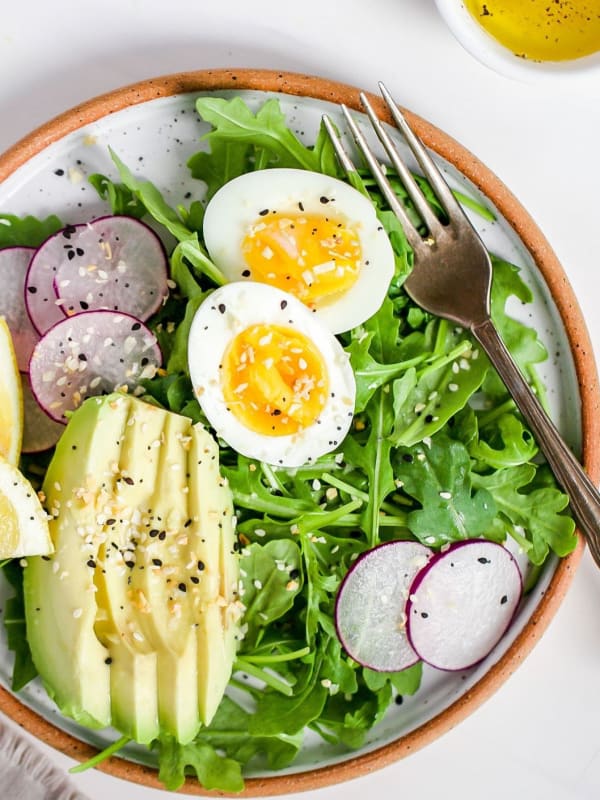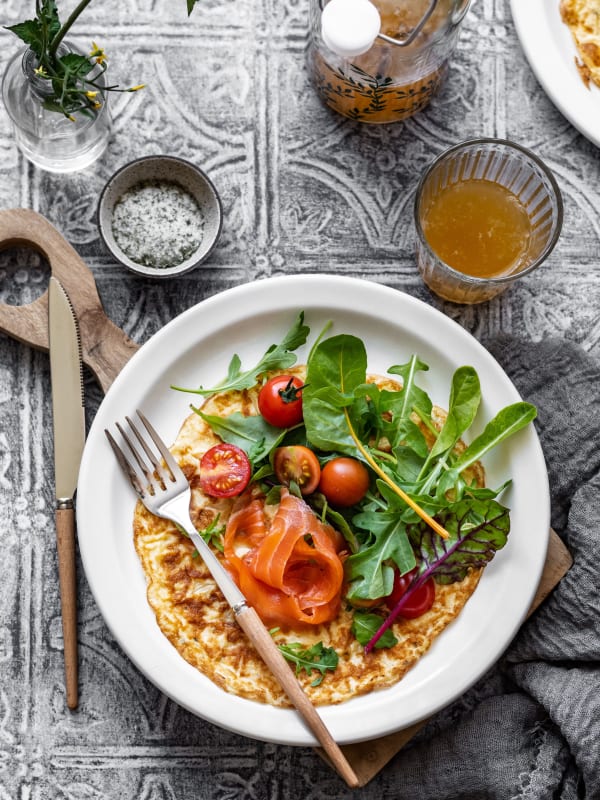Popular Conditions & Diets

This article reframes cholesterol as essential biology, not a health scare: it’s foundational for hormones (including sex hormones and vitamin D), brain function, and neurotransmitter signalling. It also challenges the simplistic “LDL = bad” narrative by pointing to how LDL becomes more concerning when it’s oxidized or glycated — a process tied closely to oxidative stress and refined-carb-heavy diets. Translation: the quality of your overall diet matters more than avoiding egg yolks.
The diet-heart hypothesis that suggests that high intake of saturated fat and cholesterol causes heart disease has been repeatedly shown to be wrong, and yet, for complicated reasons of pride, profit and prejudice, the hypothesis continues to be exploited by scientists, fund-raising enterprises, food companies and even governmental agencies. The public is being deceived by the greatest health scam of the century.
-Dr. George V. Mann
After over 50 years of concerted industry efforts to demonize dietary fats of all stripes, but especially saturated fats and cholesterol, we find ourselves at an interesting historical intersection.
On one hand, a new school of thinking has dawned, and according to its tenets, a diet high in healthy fats is beneficial for the prevention of a wide variety of degenerative health conditions, especially affecting the brain and nervous system. And cholesterol is one of those healthy fats.
High fat diets do not contribute to weight gain, and eating cholesterol does not raise your risk of coronary heart disease… it doesn’t even directly impact our cholesterol levels! Various studies have confirmed that in those who eat eggs regularly, blood cholesterol levels are completely on par with those who eat few eggs or none whatsoever.

Dietary cholesterol is only found in animal foods. So how is it that vegans can present with high cholesterol? The answer is that the relationship between our levels of circulating cholesterol, and the amount of it we get in our diet, is indirect.
When you test cholesterol levels, about 80 per cent of what you’re looking at is cholesterol produced by the liver. It does this because cholesterol is very important to our health! When we do eat foods that are rich in cholesterol, our body gets the signal that it doesn’t need to produce anymore. We produce two grams of cholesterol every day- far more than we would ever eat. However, producing endogenous (internal) cholesterol is a laborious and energy-intensive chore for the liver, which is why obtaining cholesterol from the food we eat is preferential.
When dietary cholesterol is cut off, the liver responds by producing an enzyme that converts dietary carbohydrates into usable cholesterol. Interestingly, this enzyme made by the liver to raise cholesterol levels is the same enzyme targeted by statin drugs to bring total levels of cholesterol down. The ironic but logical conclusion of these physiological facts is that easing off the sugar and refined carbs, while restoring cholesterol-rich foods in the diet, will halt the overproduction of the body’s cholesterol supply.
Steroid hormones are all synthesized from cholesterol. It is therefore the number one critical foundational building block for reproductive hormones such as testosterone and estrogen. So it’s no surprise that studies have correlated the use of statin medication with majorly compromised libido. It is among the most commonly reported side effects. Men who take statins are 200 per cent more likely to have significantly reduced testosterone.
Another hormone called calciferol, which we know more commonly as vitamin D, is made from cholesterol as well. Sunlight contacting the cholesterol in our skin is the very first step in vitamin D production. Vitamin D is not just a hormone but a very important one with receptors in almost every single cell type in the body, and deficiency can cause a huge variety of symptoms ranging from mood imbalances and aches and pains to various autoimmune conditions. It’s known as the sunshine vitamin, but it could just as easily be known as the cholesterol vitamin!
Cholesterol is an important fuel for neurons, and it is also critically important for serotonin signalling. It might therefore not be very surprising that low cholesterol is highly predictive of depression and low moods. showed a three-fold risk of depression in the low-cholesterol group compared with the high-cholesterol group. Since then, those findings have been . Meanwhile, depression, violence, and even suicide attempts have been identified as possible side effects of [cholesterol depletion with statin medication]. (Cholesterol is an important fuel for neurons, and it is also critically important for serotonin signalling. It might therefore not be very surprising that low cholesterol is highly predictive of depression and low moods. showed a three-fold risk of depression in the low-cholesterol group compared with the high-cholesterol group. Since then, those findings have been . Meanwhile, depression, violence, and even suicide attempts have been identified as possible side effects of .

Another reason why the vilification of cholesterol is somewhat interesting is that it is mirrored perfectly by the vilification of specific cholesterol-rich foods. The best example, naturally, is eggs (and their yolks in particular). The whole conversation is epitomized in the existence of the egg white omelet, a dish whose historically anecdotal popularity is tied directly to the demonization of fats in general and cholesterol in particular. What many nutrition professionals find ironic about the egg white omelet is that eschewing the yolk means losing much more than the cholesterol- indeed the various powerful life-extending micronutrients that put eggs in the ‘superfood’ category are all located in the yolk. Fat must be pretty bad if this tradeoff is worth it!
To rightfully restore dietary cholesterol to the broader pantheon of healthy options is to reclaim the beauty and value of natural, unrefined, and unprocessed whole foods. It is also to credit the inherent wisdom of the human body- after all, these glorious machines don’t produce anything without a very good reason for doing so.
And cholesterol is no exception.
Bodkin, H. (2016, June 13). High cholesterol “does not cause heart disease” new research finds, so treating with statins a “waste of time.” The Telegraph. https://www.telegraph.co.uk/science/2016/06/12/high-cholesterol-does-not-cause-heart-disease-new-research-finds/?fbclid=IwAR2iN_oEToPbi8WVw1vy0ixj1zeF0x54KVi263dc31WVLAk0UGkacmUrFvg
Cham, S., Koslik, H. J., & Golomb, B. A. (2016). Mood, Personality, and Behavior Changes During Treatment with Statins: A Case Series. Drug safety - case reports, 3(1), 1. https://doi.org/10.1007/s40800-015-0024-2
Drouin-Chartier, J. P., Chen, S., Li, Y., Schwab, A. L., Stampfer, M. J., Sacks, F. M., Rosner, B., Willett, W. C., Hu, F. B., & Bhupathiraju, S. N. (2020). Egg consumption and risk of cardiovascular disease: three large prospective US cohort studies, systematic review, and updated meta-analysis. BMJ (Clinical research ed.), 368, m513. https://doi.org/10.1136/bmj.m513

On the other hand, we are still very much in the shadow of a zeitgeist that has shaped our very perception of fatty foods. No matter how much scientific literature is published year after year, the fear that fats like cholesterol will add to our waistline or cause our hearts to seize seems to stubbornly persist.
The correlation between cholesterol and cardiac risk is dubious at best. Some would say there is no correlation at all. It’s also worth noting that more than 50 per cent of patients hospitalized following a cardiac event have cholesterol levels fully within the normal “healthy” range. Lowering cholesterol levels with medication to reduce the risk of heart attack seems to be a debunked strategy, and no matter how many statin medications flood the market, rates of vascular disease continue to rise. Far more worthy of attention, the largest contributors to adverse cardiac events are smoking, alcoholism, sedentary lifestyles, dysglycemia, and diets excessively high in refined carbohydrates.
High cholesterol may not be a problem at all. An in-depth study published by the prestigious international Lancet journal found that among hundreds of participants, higher levels of serum cholesterol were associated with lower rates of mortality from cancer and infection. Where coronary heart disease was concerned, rates of death, study participants with the lowest serum cholesterol were no better off than those with the highest serum cholesterol. The Lancet study is not isolated by any means, and a growing mountain of research has supported the same conclusions.
Even LDL, the so-called “bad cholesterol” is only of concern when it is put through reactions like oxidation or glycation. The first is a consequence of free radical exposure, and the second is a consequence of excessive refined sugars in the diet. Typically these two damaging metabolic processes that make LDL a cardiac risk go hand-in-hand. The good news is that both are entirely avoidable- without fully removing healthy cholesterol-rich foods.
It’s true- a healthy brain requires cholesterol. One of the most famous, ambitious, and long-running studies ever done, the Framingham Heart Study, found very significant differences in brain function based on levels of circulating cholesterol. It reported that lower naturally occurring cholesterol levels “are associated with poor performance on cognitive measures, which placed high demand on abstract reasoning, attention/concentration, word fluency, and executive functioning.”
Fortunately, a more nuanced view of good fats, like healthy monounsaturates from olive oil and avocados, healthy polyunsaturates from flax and seafood, and yes, even saturated fats and cholesterol from animal foods, as distinguished from bad fats, such as trans fats and heavily processed canola, cottonseed, sunflower, and vegetable oils seems to be more widely accepted every day. As the stigma wanes, fatty foods are increasingly welcomed back onto the table.
And after all, eggs aren’t the only food rich in cholesterol- beef, poultry, cheese, and butter also belong to the same list. The nice thing about reclaiming these foods, as healthy life-promoting medicines, is that it allows us to reposition our predecessors as intelligent and intuitive around food choices- not simply ignorant or uninformed. The implication of including dietary fats in abundance just like most of the generations before the 20th century, is that there is indeed wisdom in ancient ways of eating, and there is indeed nutritional value in these heritage foods.
Elias, P. K., Elias, M. F., D'Agostino, R. B., Sullivan, L. M., & Wolf, P. A. (2005). Serum cholesterol and cognitive performance in the Framingham Heart Study. Psychosomatic medicine, 67(1), 24–30. https://doi.org/10.1097/01.psy.0000151745.67285.c2
Esmay, D. (n.d.). The World’s Biggest Fad Diet (and why you should probably avoid it). Survive Diabetes. http://survivediabetes.com/lowfat.html
Fernandez M. L. (2006). Dietary cholesterol provided by eggs and plasma lipoproteins in healthy populations. Current opinion in clinical nutrition and metabolic care, 9(1), 8–12. https://doi.org/10.1097/01.mco.0000171152.51034.bf
Fernandez, M. L., & Murillo, A. G. (2022). Is There a Correlation between Dietary and Blood Cholesterol? Evidence from Epidemiological Data and Clinical Interventions. Nutrients, 14(10), 2168. https://doi.org/10.3390/nu14102168
Foster, G. D., Wyatt, H. R., Hill, J. O., McGuckin, B. G., Brill, C., Mohammed, B. S., Szapary, P. O., Rader, D. J., Edman, J. S., & Klein, S. (2003). A randomized trial of a low-carbohydrate diet for obesity. New England Journal of Medicine, 348(21), 2082–2090. https://doi.org/10.1056/nejmoa022207
Greenblatt, J. M. (2011, June 10). Low cholesterol and its psychological effects. Psychology Today. https://www.psychologytoday.com/ca/blog/the-breakthrough-depression-solution/201106/low-cholesterol-and-its-psychological-effects
Griffin B. A. (2016). Eggs: good or bad?. The Proceedings of the Nutrition Society, 75(3), 259–264. https://doi.org/10.1017/S0029665116000215
Global Cardiovascular Risk Consortium, Magnussen, C., Ojeda, F. M., Leong, D. P., Alegre-Diaz, J., Amouyel, P., Aviles-Santa, L., De Bacquer, D., Ballantyne, C. M., Bernabé-Ortiz, A., Bobak, M., Brenner, H., Carrillo-Larco, R. M., de Lemos, J., Dobson, A., Dörr, M., Donfrancesco, C., Drygas, W., Dullaart, R. P., Engström, G., … Blankenberg, S. (2023). Global Effect of Modifiable Risk Factors on Cardiovascular Disease and Mortality. The New England journal of medicine, 389(14), 1273–1285. https://doi.org/10.1056/NEJMoa2206916
Kishimoto, Y., Taguchi, C., Suzuki-Sugihara, N., Saita, E., Usuda, M., Wang, W., Masuda, Y., & Kondo, K. (2016). The Effect of the Consumption of Egg on Serum Lipids and Antioxidant Status in Healthy Subjects. Journal of nutritional science and vitaminology, 62(5), 361–365. https://doi.org/10.3177/jnsv.62.361
Morgan, R. E., Palinkas, L. A., Barrett-Connor, E. L., & Wingard, D. L. (1993). Plasma cholesterol and depressive symptoms in older men. Lancet (London, England), 341(8837), 75–79. https://doi.org/10.1016/0140-6736(93)92556-9
Mutungi, G., Waters, D., Ratliff, J., Puglisi, M., Clark, R. M., Volek, J. S., & Fernandez, M. L. (2010). Eggs distinctly modulate plasma carotenoid and lipoprotein subclasses in adult men following a carbohydrate-restricted diet. The Journal of nutritional biochemistry, 21(4), 261–267. https://doi.org/10.1016/j.jnutbio.2008.12.011
Ong, K. L., Morris, M. J., McClelland, R. L., Maniam, J., Allison, M. A., & Rye, K. A. (2016). Lipids, lipoprotein distribution and depressive symptoms: the Multi-Ethnic Study of Atherosclerosis. Translational psychiatry, 6(11), e962. https://doi.org/10.1038/tp.2016.232
Perlmutter, D., & Loberg, K. (2019). Grain brain: The surprising truth about wheat, carbs, and sugar - your Brain's silent killers. Yellow Kite. Poznyak, A. V., Nikiforov, N. G., Markin, A. M., Kashirskikh, D. A., Myasoedova, V. A., Gerasimova, E. V., & Orekhov, A. N. (2021). Overview of OxLDL and Its Impact on Cardiovascular Health: Focus on Atherosclerosis. Frontiers in pharmacology, 11, 613780. https://doi.org/10.3389/fphar.2020.613780
Poznyak, A. V., Sukhorukov, V. N., Surkova, R., Orekhov, N. A., & Orekhov, A. N. (2023). Glycation of LDL: AGEs, impact on lipoprotein function, and involvement in atherosclerosis. Frontiers in cardiovascular medicine, 10, 1094188. https://doi.org/10.3389/fcvm.2023.1094188
Roth, G. A., Mensah, G. A., Johnson, C. O., Addolorato, G., Ammirati, E., Baddour, L. M., Barengo, N. C., Beaton, A. Z., Benjamin, E. J., Benziger, C. P., Bonny, A., Brauer, M., Brodmann, M., Cahill, T. J., Carapetis, J., Catapano, A. L., Chugh, S. S., Cooper, L. T., Coresh, J., … Fuster, V. (2020).
Global burden of cardiovascular diseases and risk factors, 1990–2019. Journal of the American College of Cardiology, 76(25), 2982–3021. https://doi.org/10.1016/j.jacc.2020.11.010
Sachdeva, A., Cannon, C. P., Deedwania, P. C., Labresh, K. A., Smith, S. C., Jr, Dai, D., Hernandez, A., & Fonarow, G. C. (2009). Lipid levels in patients hospitalized with coronary artery disease: an analysis of 136,905 hospitalizations in Get With The Guidelines. American heart journal, 157(1), 111–117.e2. https://doi.org/10.1016/j.ahj.2008.08.010
Shrivastava, S., Pucadyil, T. J., Paila, Y. D., Ganguly, S., & Chattopadhyay, A. (2010). Chronic cholesterol depletion using statin impairs the function and dynamics of human serotonin(1A) receptors. Biochemistry, 49(26), 5426–5435. https://doi.org/10.1021/bi100276b
Soliman G. A. (2018). Dietary Cholesterol and the Lack of Evidence in Cardiovascular Disease. Nutrients, 10(6), 780. https://doi.org/10.3390/nu10060780
Teicholz N. (2023). A short history of saturated fat: the making and unmaking of a scientific consensus. Current opinion in endocrinology, diabetes, and obesity, 30(1), 65–71. https://doi.org/10.1097/MED.0000000000000791
Weverling-Rijnsburger, A. W., Blauw, G. J., Lagaay, A. M., Knock, D. L., Meinders, A. E., & Westendorp, R. G. (1997). Total cholesterol and risk of mortality in the oldest old. The Lancet, 350(9085), 1119–1123. https://doi.org/10.1016/s0140-6736(97)04430-9